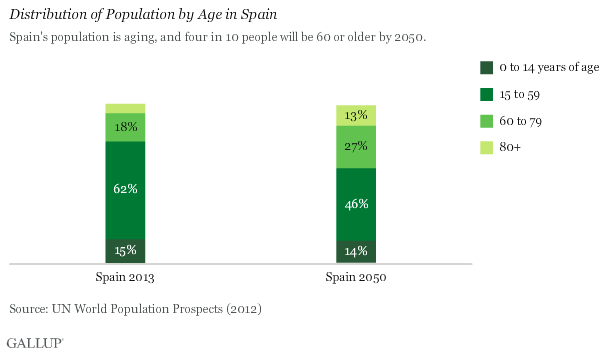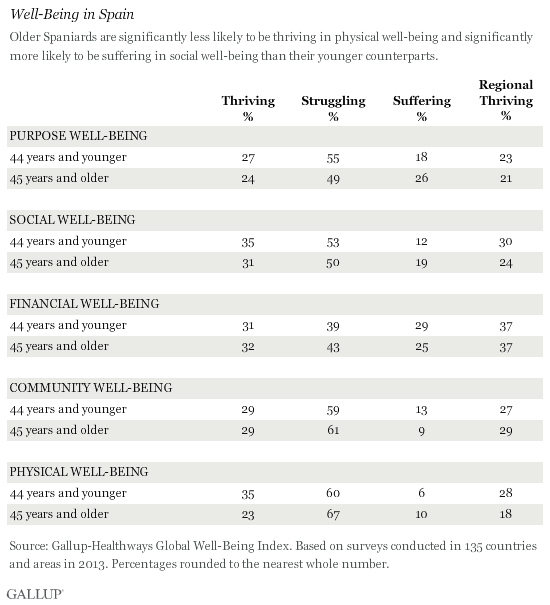STORY HIGHLIGHTS
- Aging Spain is facing increasing healthcare costs
- Traditional family support systems are declining for the elderly
- Policies must integrate health and social care for the elderly
Spain’s national healthcare system is considered one of the best in the world. However, budgetary cuts resulting from the austerity measures that followed the global financial collapse have left it potentially weakened — just when demand for care is growing among the country’s aging population.
As it emerges from tough economic times, Spain must confront the challenge of adequately managing the health and well-being of its older citizens in the face of rising medical costs, limited economic growth and changing social and family dynamics.
Along with other countries in Europe, Spain’s population is graying after decades of falling birth rates. Nearly one-quarter (24%) of Spain’s population was 60 or older in 2013, a percentage that is expected to rise to four in 10 (40%) by 2050. In contrast, the percentage of Spaniards aged 15 to 59 is projected to fall — from about two-thirds of the population (62%) in 2013 to less than half (46%) in 2050. This means that as older Spaniards put more strain on the healthcare system, there will be fewer working-aged people to help shoulder the burden.
A Well-Being Approach to Better Health Outcomes
A key way to help manage this growing challenge is through interventions that target a population’s well-being. Gallup and Sharecare have found that improving people’s well-being can lead to a higher quality of life and reduced healthcare costs, among other vital outcomes. This is particularly important among older people, who typically use the healthcare system more frequently than any other age group.
Managing a population’s well-being begins with measurement, and the Gallup-Sharecare Global Well-Being Index gauges people’s perceptions of their well-being to determine if they are thriving, struggling or suffering in five specific elements:
- Purpose: liking what you do each day and being motivated to achieve your goals
- Social: having supportive relationships and love in your life
- Financial: managing your economic life to reduce stress and increase security
- Community: liking where you live, feeling safe and having pride in your community
- Physical: having good health and enough energy to get things done daily
Well-being data can help leaders prioritize the most effective interventions for individuals and entire communities. By accurately assessing where a population stands in each of the five elements, leaders have a starting point for designing targeted strategies that can improve health outcomes and help cut rising costs.
Older Spaniards Less Likely to Thrive Physically, More Likely to Suffer Socially
When the Gallup-Sharecare Global Well-Being Index was administered in Spain in 2013, the resulting State of Global Well-Being report showed that about one in three Spaniards (35%) under age 45 are thriving in physical well-being, significantly higher than the roughly one in four (23%) of those aged 45 or older who are thriving in this element. In social well-being, those 45 years or older are significantly more likely to be suffering, compared with their counterparts under the age of 45 (19% vs. 12%). In purpose, community and financial well-being, older and younger Spaniards seem to be in the same boat, with similar percentages in both age groups thriving in each category.
Compared with their European counterparts, Spaniards’ results are stronger in some elements than others. They are more likely to be thriving in purpose, social and physical well-being than the rest of Europe, but they are less likely to be thriving in financial well-being.
Social well-being appears to be the key to improving health outcomes for older people in Spain, based on findings from the Gallup-Sharecare Global Well-Being Index. For example, Spaniards who are thriving in social well-being are 45% more likely to evaluate their overall lives highly. These effects extend to physical well-being — those who are thriving in social well-being are more than twice as likely to be thriving in physical well-being as those who are not. Individuals who are not thriving in social well-being, on the other hand, are 30% more likely to say that they experienced stress yesterday.
Traditionally, social support from younger family members has played a strong role in sustaining the health of older residents in Spanish society. However, family dynamics have suffered in the bleak economy, with adult children sometimes forced to relocate away from aging parents to find work. In other cases, instead of relying on the younger generation for help, retirees find themselves supporting unemployed children and grandchildren with their pension or savings.
Further, austerity measures in Spain have resulted in a gutting of dependency laws that would otherwise provide support to grown children acting as caregivers for their parents. And years of declining fertility rates have meant that there are fewer children around to look after elderly parents in general. These are some of the circumstances that have potentially contributed to lower social well-being among older Spaniards.
Combining Healthcare and Social Well-Being Solutions
Health providers and policymakers in Spain must take a proactive approach in addressing the coming challenges associated with an aging population who are less able to rely on traditional systems of care. The approach must include strategies that not only keep people physically healthy but also sustain or increase their well-being. Integrating innovative social care solutions within the traditional healthcare model in Spain is an important step to maximizing the health and well-being of this age group and potentially reducing healthcare costs.
Social care can include emotional and practical support to help people continue to live independently or semi-autonomously as they age instead of in costly, around-the-clock care facilities. Leaders should consider pragmatic, relatively low-cost approaches like these when designing effective social well-being strategies:
- Local and community outreach programs designed to promote health and prevent illness, such as a diabetes care program
- Programs that emphasize regularly checking in on and interacting with elderly residents and ensuring their well-being needs are met
- Meal delivery or preparation assistance to ensure proper nutritional intake among older Spaniards
- Help with managing tasks such as home maintenance, cleaning and shopping
- Improvements in information, transparency, monitoring and evaluation of services
- Alternatives to traditional hospitalization such as home care for less acute conditions
- Strategies to reduce inequalities in healthcare, including outreach to poorer communities and populations who are less likely to receive care
Research by Gallup and Sharecare shows that people with higher well-being are healthier, more productive and more resilient in changing times — in that respect, Spain is well-equipped to confront the challenges ahead. The Gallup-Sharecare Global Well-Being Index finds that nearly one-quarter (24%) of the country’s residents are thriving in at least three of the five well-being elements, and Spain ranks 10th among all countries in Europe on this measure. Additionally, Spain outperforms Europe in the percentage thriving in three well-being elements: purpose, social and physical. Spaniards have strong social well-being — ranking fifth in Europe — suggesting a solid foundation on which to further integrate social care into its model of healthcare.
“Well-being data from Spain demonstrate resilience in the context of global fiscal challenges,” says Oliver Harrison, senior vice president at Sharecare International. “There are many positives for the country and regions to build upon. As we look to the future, with an aging population, the focus should be on maintaining good scores on well-being, whilst delivering targeted actions to improve lower scores across communities.”
SURVEY METHODS
Results for the Gallup-Sharecare Global Well-Being Index are based on telephone and face-to-face interviews on the Gallup World Poll, with a random sample of approximately 133,000 adults, aged 15 and older, living in 135 countries and areas in 2013. Gallup-Sharecare Global Well-Being Index results for Spain are based on landline and cellular telephone interviews conducted May 7-24, 2013, as part of the Gallup World Poll, with a random sample of 1,004 adults, aged 15 and older, living in Spain.
For results based on the total sample of national adults, the margin of sampling error is less than ±1 percentage point at the 95% confidence level. For results based on the total sample of national adults in Spain, the margin of sampling error is ±3.8 percentage points at the 95% confidence level. All reported margins of sampling error include computed design effects for weighting.
All country-level analyses use country weights. Global and regional analysis uses projection weights that account for country size. Minimum sample sizes of N=300 apply.
In addition to sampling error, question wording and practical difficulties in conducting surveys can introduce error or bias into the findings of public opinion polls.
Each element in the Global Well-Being Index contains two questions asked of all respondents:
Purpose Well-Being:
- You like what you do every day.
- You learn or do something interesting every day.
Social Well-Being:
- Someone in your life always encourages you to be healthy.
- Your friends and family give you positive energy every day.
Financial Well-Being:
- You have enough money to do everything you want to do.
- In the last seven days, you have worried about money.
Community Well-Being:
- The city or area where you live is a perfect place for you.
- In the last 12 months, you have received recognition for helping to improve the city or area where you live.
Physical Well-Being:
- In the last seven days, you have felt active and productive every day.
- Your physical health is near-perfect.

